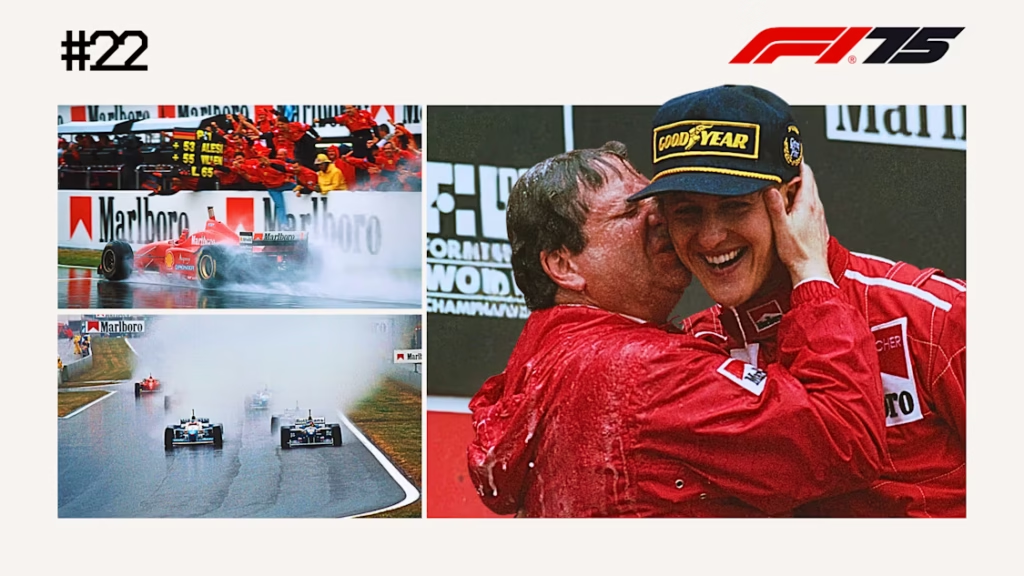Just in:GREATEST RACES #22: Michael Schumacher seals one of his ‘greatest ever’ victories in a…read more

GREATEST RACES #22: Michael Schumacher seals one of his ‘greatest ever’ victories in a…read more
As Formula 1 celebrates its 75th anniversary, the sport is revisiting some of its most unforgettable races, sharing the drama, skill, and legacy that have defined the championship. Among these standout events, coming in at number 22 in the countdown, is the 1996 Spanish Grand Prix—an extraordinary race in which Michael Schumacher delivered what many consider one of the finest performances of his career.
The race, held at the Circuit de Barcelona-Catalunya, marked a significant moment in Schumacher’s journey. It was only his seventh outing with Ferrari after making the switch from Benetton, where he had already secured two world championships. Ferrari, at the time, was struggling to regain its former glory, and their machinery lagged behind the dominant Williams-Renault cars, particularly those driven by Damon Hill and Jacques Villeneuve.
On race day, torrential rain blanketed the circuit, turning the track into a treacherous test of skill and nerve. Conditions were so severe that drivers struggled to keep their cars pointing in the right direction, let alone maintain a competitive pace. The wet weather would become the great equalizer—and Schumacher’s opportunity to shine.
Starting third on the grid behind Hill and Villeneuve, Schumacher didn’t get off to a perfect start. In fact, he dropped down the order initially. However, as the rain intensified, so did his performance. With an astonishing display of car control, strategic insight, and sheer bravery, Schumacher began carving his way through the field. While others spun or slithered off the track, he maintained relentless consistency and speed.
Schumacher’s laps were not only significantly faster than his rivals’, but remarkably consistent given the chaos around him. At one point during the race, he was lapping several seconds quicker than anyone else, showcasing his unmatched talent in the wet. His Ferrari, often described as difficult to handle in dry conditions, came alive in the rain under his guidance.
By lap 12, he had surged past Villeneuve and into the lead. From there, he never looked back. The German driver continued to build a commanding advantage, at times lapping over three seconds faster than the rest of the field. As the race progressed, even experienced racers struggled to stay on the track, but Schumacher maintained his pace and composure with laser-like focus.
By the end of the race, he had built a gap of over 45 seconds to his closest challenger. Only six drivers managed to finish on the lead lap, which underscored just how difficult the conditions were. Schumacher’s triumph wasn’t just a personal milestone—it was Ferrari’s first victory in over a year and his first for the iconic team.
The magnitude of the performance was recognized immediately. Jean Alesi, a former Ferrari driver and no stranger to tough conditions, called it “one of the greatest ever” drives in Formula 1 history. Observers marveled not just at the win, but at how dominant it was in a car that was clearly inferior to the Williams.
This Grand Prix set the tone for Schumacher’s era at Ferrari. Although 1996 wasn’t a championship-winning season, the victory in Spain proved that Schumacher had the skill, determination, and vision to transform Ferrari into a title-winning force. Over the following years, he would do exactly that, claiming five consecutive world championships with the team between 2000 and 2004.
The 1996 Spanish Grand Prix remains etched in F1 folklore not just for the result, but for the way it unfolded. It was a race that tested every driver’s limits—and only Schumacher truly mastered it. In a sport defined by moments of brilliance, this race was one of Michael Schumacher’s absolute finest.







